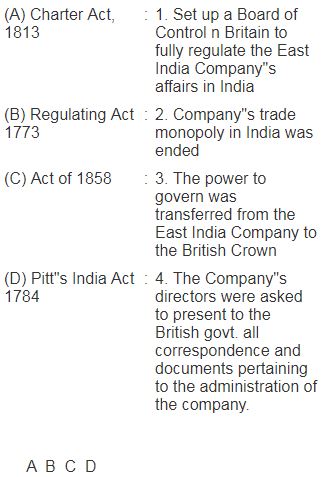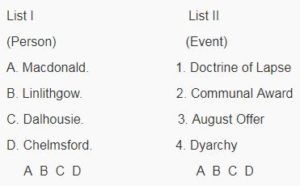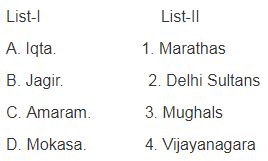UPSC Indian Modern History 11 (Old Year Questions)
You'll Read
UPSC Indian Modern History 11 (Old Year Questions)
Quiz-summary
0 of 20 questions completed
Questions:
- 1
- 2
- 3
- 4
- 5
- 6
- 7
- 8
- 9
- 10
- 11
- 12
- 13
- 14
- 15
- 16
- 17
- 18
- 19
- 20
Information
20 questions based on Indian Modern History.
You have already completed the quiz before. Hence you can not start it again.
Quiz is loading...
You must sign in or sign up to start the quiz.
You have to finish following quiz, to start this quiz:
Results
0 of 20 questions answered correctly
Your time:
Time has elapsed
You have reached 0 of 0 points, (0)
| Average score |
|
| Your score |
|
Categories
- Not categorized 0%
- 1
- 2
- 3
- 4
- 5
- 6
- 7
- 8
- 9
- 10
- 11
- 12
- 13
- 14
- 15
- 16
- 17
- 18
- 19
- 20
- Answered
- Review
-
Question 1 of 20
1. Question
1 pointsThe real intention of the British to include the princely states in the Federal Union proposed by the India Act of 1935 was to :
Correct
Ans d
The British real intention was to use the princes to counter balance anti-imperialist doctrines of the nationalist leaders. The princes were loyal to the British authorities.Incorrect
Ans d
The British real intention was to use the princes to counter balance anti-imperialist doctrines of the nationalist leaders. The princes were loyal to the British authorities. -
Question 2 of 20
2. Question
1 pointsMatch List I (Acts of Colonial Government of India) with List II (Provisions) and select the correct answer using the codes given below the lists :
 Correct
Correct
Ans a
A – 2, B – 4, C – 3, D – 1Incorrect
Ans a
A – 2, B – 4, C – 3, D – 1 -
Question 3 of 20
3. Question
1 pointsWhich one of the following Acts of British India strengthened the Viceroy”s authority over his executive council by substituting “portfolio” or departmental system for corporate functioning ?
Correct
Ans a
The Indian Councils Act, 1861 passed during Lord Cannings Viceroyality has strengthened the Viceroy’s authority over his executive Council by substituting ‘portfolio’ or departmental system for corporate functioning.Incorrect
Ans a
The Indian Councils Act, 1861 passed during Lord Cannings Viceroyality has strengthened the Viceroy’s authority over his executive Council by substituting ‘portfolio’ or departmental system for corporate functioning. -
Question 4 of 20
4. Question
1 pointsThe President of Indian National Congress at the time of partition of India was
Correct
Ans b
J.B. Kripalani was the President of INC at the time of Partition of India.Incorrect
Ans b
J.B. Kripalani was the President of INC at the time of Partition of India. -
Question 5 of 20
5. Question
1 pointsWith reference to colonial period of Indian history, Match Lit I with List II and select the correct answer using the codes given below the lists :
 Correct
Correct
Ans c
Ramsay Macdonald – Communal Award, Lord Linlithgow – August Offer, Lord Dalhousie – Doctrine of Lapse, Chelmsford – Dyarchy.Incorrect
Ans c
Ramsay Macdonald – Communal Award, Lord Linlithgow – August Offer, Lord Dalhousie – Doctrine of Lapse, Chelmsford – Dyarchy. -
Question 6 of 20
6. Question
1 pointsAssertion (A): The Battle of Khanna was certainly more decisive and significant that the first Battle of Panipat.
Reason (R): Rana Sanga, the Rajput hero, was certainly a more formidable adversary than Ibrahim Lodi.
Correct
Ans a
Rana Sanga was more formidable adversely than Ibrahim Lodi as he had once defeated Ibrahim Lodi. So battle of Khanna was certainly more significant and decisive than first battle of Panipat.Incorrect
Ans a
Rana Sanga was more formidable adversely than Ibrahim Lodi as he had once defeated Ibrahim Lodi. So battle of Khanna was certainly more significant and decisive than first battle of Panipat. -
Question 7 of 20
7. Question
1 pointsWho among the following Indian rulers established embassies in foreign countries on modern lines?
Correct
Ans d
Tipu Sultan established embassies in foreign countries like Egypt, France and Turkey on modern lines.Incorrect
Ans d
Tipu Sultan established embassies in foreign countries like Egypt, France and Turkey on modern lines. -
Question 8 of 20
8. Question
1 pointsThe Hunter Commission was appointed after the
Correct
Ans b
To investigate into the events of Jallianwalabagh tragedy, occurred in April 13, 1919, the Hunter Commission was appointed.Incorrect
Ans b
To investigate into the events of Jallianwalabagh tragedy, occurred in April 13, 1919, the Hunter Commission was appointed. -
Question 9 of 20
9. Question
1 pointsUnder the Permanent Settlement, 1793, the Zamindars were required to issue pattas to the farmers which were not issued by many of the Zamindars. The reason was
Correct
Ans b
There was no official check upon the Zamindars under the permanent settlement, 1793. They were required to give 10/11th of revenue collections to the British authorities.Incorrect
Ans b
There was no official check upon the Zamindars under the permanent settlement, 1793. They were required to give 10/11th of revenue collections to the British authorities. -
Question 10 of 20
10. Question
1 pointsConsider the following statements:
1. Arya Samaj was founded in 1835.
2. Lala Lajpat Rai opposed the appeal of Arya Samaj to the authority of Vedas in support of its social reform programmes.
3. Under Keshab Chandra Sen, the Brahmo Samaj campaigned for women’s education.
4. Vinoba Bhave founded the Sarvodaya Samaj to work among refugees.
Which of these statements are correct?Correct
Ans d
Arya Samaj was founded in the year 1875 by Swami Dayananda Saraswathi. Lala Lajpat Rai was one of the members of Arya Samaj and supported the appeal of Arya Samaj to the authority of Vedas in support of the social reform programmes.Incorrect
Ans d
Arya Samaj was founded in the year 1875 by Swami Dayananda Saraswathi. Lala Lajpat Rai was one of the members of Arya Samaj and supported the appeal of Arya Samaj to the authority of Vedas in support of the social reform programmes. -
Question 11 of 20
11. Question
1 pointsWho among the following leaders proposed to adopt Complete Independence as the goal of the Congress in the Ahmedabad session of 1920?
Correct
Ans b
Hasrat Mohani proposed to adopt complete independence as the goal of the Congress in the Ahmedabad session of 1920. It was opposed by Gandhiji which led to the rejection of resolution for complete independence.Incorrect
Ans b
Hasrat Mohani proposed to adopt complete independence as the goal of the Congress in the Ahmedabad session of 1920. It was opposed by Gandhiji which led to the rejection of resolution for complete independence. -
Question 12 of 20
12. Question
1 pointsWho among the following organized the famous Chittagong armoury raid?
Correct
Ans b
Surya Sen led the famous Chittagong Armoury raid on 18th April 1930.Incorrect
Ans b
Surya Sen led the famous Chittagong Armoury raid on 18th April 1930. -
Question 13 of 20
13. Question
1 pointsA London branch of the All India Muslim League was established in 1908 under the presidency of
Correct
Ans b
Aga Khan was the President of Muslim League in India. Liaquat Ali and Jinnah were in Congress at that time. Ameer Ali, a judge from Calcutta High Court (1890-1904), later settled in England and founded Muslim League there.Incorrect
Ans b
Aga Khan was the President of Muslim League in India. Liaquat Ali and Jinnah were in Congress at that time. Ameer Ali, a judge from Calcutta High Court (1890-1904), later settled in England and founded Muslim League there. -
Question 14 of 20
14. Question
1 pointsWho amongst the following Englishmen, first translated Bhagvad-Gita into English?
Correct
Ans b
Charles Wilkins was the first Englishmen to translate Bhagavad Gita into English. He was a member of Asiatic Society founded by William Jones.Incorrect
Ans b
Charles Wilkins was the first Englishmen to translate Bhagavad Gita into English. He was a member of Asiatic Society founded by William Jones. -
Question 15 of 20
15. Question
1 pointsWho among the following streamlined the Maratha administration after Sambhaji ?
Correct
Ans b
Peshwa Balaji Viswanah streamlined the Maratha administration after Sambhaji.Incorrect
Ans b
Peshwa Balaji Viswanah streamlined the Maratha administration after Sambhaji. -
Question 16 of 20
16. Question
1 pointsMatch List-I with List-II and select the correct answer using the codes given the lists :
 Correct
Correct
Ans b
These were all land grants.
Iqta – Delhi Sultans, Jagir – Mughals
Amaram – Vijayanagara rulers, Mokasa – MarathasIncorrect
Ans b
These were all land grants.
Iqta – Delhi Sultans, Jagir – Mughals
Amaram – Vijayanagara rulers, Mokasa – Marathas -
Question 17 of 20
17. Question
1 points“In this instance we could not play off the Mohammedans against the Hindus.” To which one of the following events did this remark of Aitchison relate ?
Correct
Ans c
During the Khilafat and Non-Cooperation Movement period, Muslims joined with Hindus to struggle against the common enemy British. This period had seen unprecedented unity between these two religions. This forced Aitchison to make the above statement.Incorrect
Ans c
During the Khilafat and Non-Cooperation Movement period, Muslims joined with Hindus to struggle against the common enemy British. This period had seen unprecedented unity between these two religions. This forced Aitchison to make the above statement. -
Question 18 of 20
18. Question
1 pointsThe Indian National Army (I.N.A.) came into existence in 1943 in
Correct
Ans c
Though INA was formed by Captain Mohan Singh, on 1 September 1942, it was failed and came into existence again on 2 July 1943, when Subhash Chandra Bose reached Singapore and gave the rousing war cry of “Dilli Chalo”.Incorrect
Ans c
Though INA was formed by Captain Mohan Singh, on 1 September 1942, it was failed and came into existence again on 2 July 1943, when Subhash Chandra Bose reached Singapore and gave the rousing war cry of “Dilli Chalo”. -
Question 19 of 20
19. Question
1 pointsThe last major extension of British Indian territory took place during the time of
Correct
Ans b
Dalhousie (1849-56) introduced the ‘Doctrine of Lapse’ which proved fatal for the princely states. Based on this, he annexed a lot of States and expanded the British Indian territory to a large extent.Incorrect
Ans b
Dalhousie (1849-56) introduced the ‘Doctrine of Lapse’ which proved fatal for the princely states. Based on this, he annexed a lot of States and expanded the British Indian territory to a large extent. -
Question 20 of 20
20. Question
1 pointsAs an alternative to the partition of India, Gandhiji suggested to Mountbatten that he
Correct
Ans b
Gandhiji, as an alternative to the partition of India, suggested to Mountbatten to invite Jinnah to form the Government. But it was opposed by Congress as well as Muslim League.Incorrect
Ans b
Gandhiji, as an alternative to the partition of India, suggested to Mountbatten to invite Jinnah to form the Government. But it was opposed by Congress as well as Muslim League.
